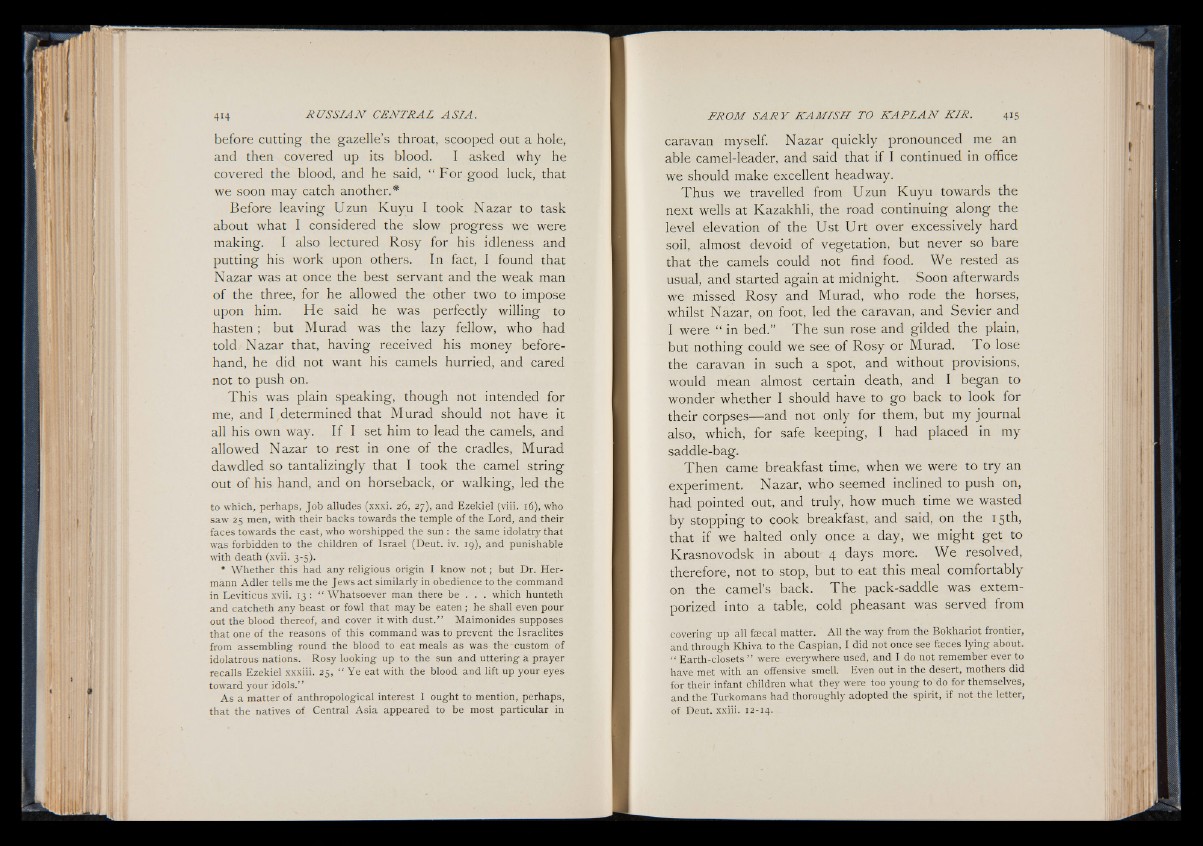
before cutting the gazelle’s throat, scooped out a hole,
and then covered up its blood. I asked why he
covered the blood, and he said, “ For good luck, that
we soon may catch another.*
Before leaving Uzun Kuyu I took Nazar to task
about what I considered the slow progress we were
making. I also lectured Rosy for his idleness and
putting his work upon others. In fact, I found that
Nazar was at once the best servant and the weak man
of the three, for he allowed the other two to impose
upon him. He said he was perfectly willing to
hasten; but Murad was the lazy fellow, who had
told Nazar that, having received his money beforehand,
he did not want his camels hurried, and cared
not to push on.
This was plain speaking, though not intended for
me, and I determined that Murad should not have it
all his own way. I f I set him to lead the camels, and
allowed Nazar to rest in one of the cradles, Murad
dawdled so tantalizingly that I took the camel string
out of his hand, and on horseback, or walking, led the
to which, perhaps, Job alludes (xxxi. 26, 27), and Ezekiel (viii. 16), who
saw 25 men, with their backs towards the temple of the Lord, and their
faces towards the east, who worshipped the sun : the same idolatry that
was forbidden to the children of Israel (Deut. iv. 19), and punishable
with death (xvii. 3-5).
* Whether this had any religious origin I know not; but Dr. Hermann
Adler tells me the Jews act similarly in obedience to the command
in Leviticus xvii. 13 : “ Whatsoever man there be . . . which hunteth
and catcheth any beast or fowl that may be eaten; he shall even pour
out the blood thereof, and cover it with dust.” Maimonides supposes
that one of the reasons of this command was to prevent the Israelites
from assembling round the blood to eat meals as was the custom of
idolatrous nations. Rosy looking up to the sun and uttering a prayer
recalls Ezekiel xxxiii. 25, “ Ye eat with the blood and lift up your eyes
tow'ard your idols.”
As a matter of anthropological interest 1 ought to mention, perhaps,
that the natives of Central Asia appeared to be most particular in
caravan myself. Nazar quickly pronounced me an
able camel-leader, and said that if I continued in office
we should make excellent headway.
Thus we travelled from Uzun Kuyu towards the
next wells at Kazakhli, the road continuing along the
level elevation of the Ust Urt over excessively hard
soil, almost devoid of vegetation, but never so bare
that the camels could not find food. We rested as
usual, and started again at midnight. Soon afterwards
we missed Rosy and Murad, who rode the horses,
whilst Nazar, on foot, led the caravan, and Sevier and
I were “ in bed.” The sun rose and gilded the plain,
but nothing could we see of Rosy or Murad. T o lose
the caravan in such a spot, and without provisions,
would mean almost certain death, and I began to
wonder whether I should have to go back to look for
their corpses— and not only for them, but my journal
also, which, for safe keeping, I had placed in my
saddle-bag.
Then came breakfast time, when we were to try an
experiment. Nazar, who seemed inclined to push on,
had pointed out, and truly, how much time we wasted
by stopping to cook breakfast, and said, on the 15th,
that if we halted only once a day, we might get to
Krasnovodsk in about 4 days more. We resolved,
therefore, not to stop, but to eat this meal comfortably
on the camel’s back. T h e pack-saddle was extemporized
into a table, cold pheasant was served from
covering up all faecal matter. All the way from the Bokhariot frontier,
and through Khiva to the Caspian, I did not once see faeces lying about.
“ Earth-closets ” were everywhere used, and I do not remember ever to
have met with an offensive smell. Even out in the desert, mothers did
for their infant children what they were too young to do for themselves,
and the Turkomans had thoroughly adopted the spirit, if not the letter,
of Deut. xxiii. 12-14.